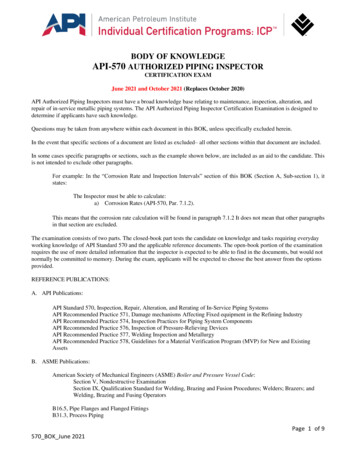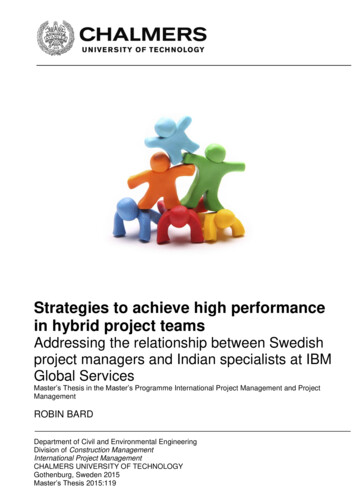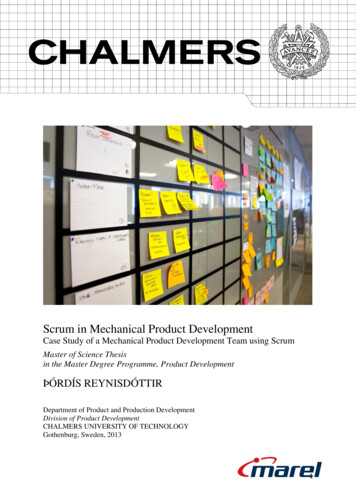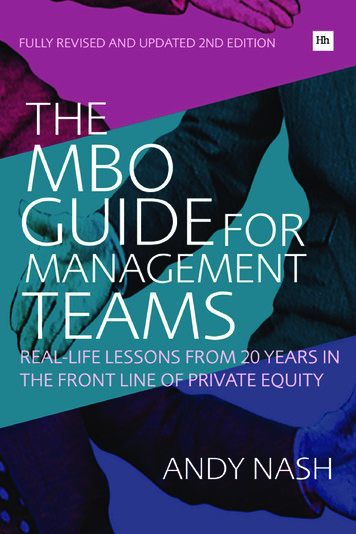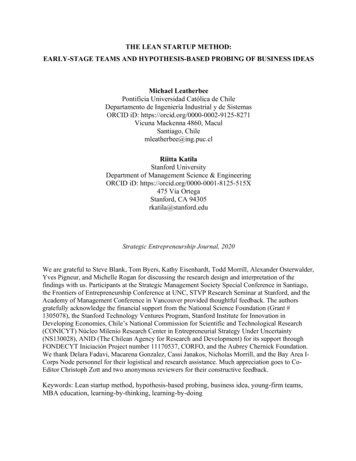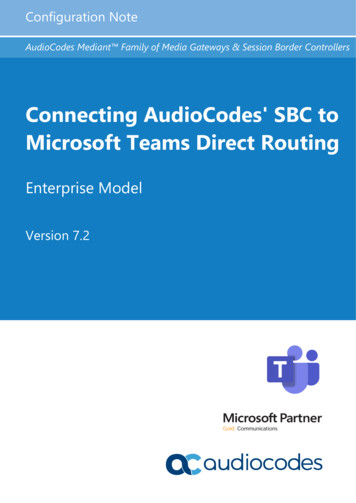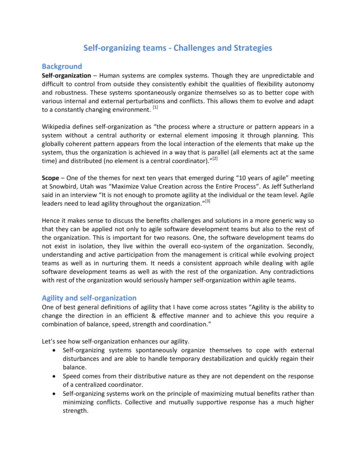
Transcription
MOR 570: Leading Effective TeamsSpring 2022Instructor:Jody Tolan, MBA, Ed.D.Office Hours: Thursdays, 2-3:30 pm I am in my office or available via Zoom. Feel free to emailme to make an appointment if this time is not convenient for you.Office:Hoffman Hall, Room 430Email:tolan@marshall.usc.eduOffice Phone: 213-740-4681; Best to reach me via email or call during office hoursCourse DescriptionIn today’s businesses, teams are a basic organizationalbuilding block. Teaming is consistently listed as one of thetop skills that recruiters look for in graduating MBAs. Thiscourse conveys knowledge and practical tools that helpstudents become more productive team members andleaders. Topics include the characteristics of highperforming teams, leadership strategies for creatingperforming teams, strategies for avoiding dysfunctionalteam dynamics, and best practices for managing diverseand virtual teams.Learning ObjectivesUpon completion of this course each student should be able to: Understand and apply the theoretical concepts guiding effective team performance. Understand and apply appropriate steps for managing team meetings and groupprocesses. Recognize and diagnose dysfunctional team behaviors and identify appropriate actionsfor improving the team performance. Develop and demonstrate the ability to apply facilitation and feedback skills to promoteteam communication, collaboration, and performance. Demonstrate effective team leadership, membership, and organizational ability to createand sustain a high performing team.Required Course Materials Rath, T. (2007). StrengthsFinder 2.0 from Gallup: Discover Your CliftonStrengths. GallupPress. ISBN-13: 978-1595620156[IMPT NOTE: Please purchase the book and not just the assessment online. If you were to1
purchase the CliftonStrengths assessment online from Gallup, it does not come with a bookor e-book. IF YOU HAVE RESULTS from taking the assessment before, you can use thoseresults and do not need to purchase the book or another assessment. Any concerns, just emailme.]Dyer Jr, W.G., Dyer, J.H., & Dyer, W.G. (2013). Team Building: Proven strategies forimproving team performance. Fifth edition. John Wiley & Sons. ISBN-13: 978-1118105139[NOTE: This text is available online from the USC Libraries using your USC credentials.]Hackman, J.R. (2002). Leading teams: Setting the stage for great performances. HarvardBusiness Press. ISBN-13: 978-1578513338Katzenbach, J.R., & Smith, D.K. (2001). The Discipline of Teams: A mindbook-workbook fordelivering small group performance. John Wiley & Sons. ISBN-13: 978-0471382546Lencioni, P. (2005). Overcoming the Five Dysfunctions of a Team: A Field Guide forLeaders, Managers and Facilitators. Jossey-Bass. ISBN-13: 978-0787976378Harvard Coursepack of cases will be posted in Blackboard. There are only a few cases so itwon't be a big expense.Any relevant additional articles and optional readings will be posted on Blackboard.Blackboard is the primary channel of communication for this course so take note ofannouncements and other email messages you receive that may highlight course news,requirements, and optional material.Assignments and GradingASSIGNMENTPercentage ofGradeWeek Due15%10%10%5%N/AWeek 3Week 5Week 8 (Proj #1) & 16 (Proj #2)15%25%10%10%Week 7Week 14Weeks 15 & 16Week 16INDIVIDUAL COMPONENTSClass ParticipationPersonal Team Member ProfileTeaming Exercise ReflectionPeer Evaluation & FeedbackTEAM COMPONTENTSTeam Project #1: Case AnalysisTeam Project #2: Team ChoiceTeam Project #2 PresentationProject #2 After Action ReviewParticipationThis course requires active participation from every individual in the class, includingparticipation in case discussions, in-class exercises, and team activities. Because each sessionincludes either a case discussion or exercise, students should be fully prepared to participate inclass. This requires having read the appropriate materials and engaging in high-qualitydiscussion or conversation during class. You will not be graded on the specific outcomes of anycase discussion or exercise, but on the quality of your engagement and preparation. High qualityparticipation includes contributing actively to case discussions (with comments or questions thatare topical, informed by the case materials, and that help move the discussion forward) and2
engaging authentically with exercises and simulations (putting forth your best effort andreflecting thoughtfully on the process). It will not be possible to participate effectively in thisclass without doing the assigned reading and preparing for in-class case discussion (i.e., readingthe case and preparing notes for discussion).Our class will be more engaging if everyone comes prepared to listen and share. Mostparticipation will be voluntary; however, individuals will occasionally be called upon “cold” inorder to encourage active participation and to gain multiple perspectives. If you feel that you arepreparing well for class but that you are not being called on enough, please let me know so that Ican address the issue.I recognize the potential difficulties with 70 people contributing to each class discussion andwill score participation on the basis of quality as opposed to quantity. While some students arefar more comfortable than others with class participation, all students should make an effort tocontribute meaningfully. My evaluation of in-class participation will be based on the following: Relevance – Connect your comment the subject at hand. It is really only relevant andappropriate comments that bolster the learning experience.Responsiveness – Connect your comment to what someone else has said.Analysis – Try to use consistent and logical reasoning. How can you use data/conceptsfrom course materials, personal experience, or general knowledge to support theassertions/findings?Value – Consider how your contribution furthers the understanding of the issues at hand.Can you build on your original thought so that it pushes class discussion and learning?Clarity – Is your comment concise and understandable?Please note that attendance is not participation. Disruptive behaviors such as eating, entering andexiting during class discussion/activities, late arrivals or early departures (without prior approval)among other distractions may reduce your participation credit in that session. If you have anysignificant issues that may affect your attendance and/or participation, please let’s discuss assoon as possible. I’m happy to make accommodations that make sense for all of us. For moredetailed information on what constitutes strong participation see the last page of the syllabus,Further Information: Class Participation.It may seem obvious, but attendance is required whether we hold class on Zoom or in theclassroom. Many class sessions will include team activities and won’t be effective is allmembers are not present. Therefore, if you need to miss class for any reason, please notifyme via email at least 24 hours in advance. There is no penalty for missing one class session,however repeated absence without approval will have a significant impact on your grade.Personal Team Member ProfileEmotional intelligence – specifically reflection & self-awareness - is central to effectiveleadership and this naturally extends to leading teams. After completing several self-assessmentsand class exercises, you will write a one-page profile of your key strengths, attributes and skillsthat contribute to successful team performance. You will address questions such as what makesyou a valuable team member as well as what gaps or weaknesses you need to be aware of or3
develop when teaming with others. Additional instructions will be posted on Assignments inBlackboard.Teaming Exercise ReflectionThis personal reflection assignment gives you the opportunity to review, reflect, and write aboutwhat you learned from your experience in the Teaming ELC exercise. It provides the foundationof your own personal accountability as a team member and establishes key foundations for yourteam. After engaging in the Teaming Exercise in the ELC, you will write a two-page doublespaced memo analyzing the experience from a team and personal point of view. Additionalinstructions will be posted on Assignments in Blackboard.Peer Evaluation and FeedbackFeedback helps you learn and improve your performance as well as the quality of your output asa team. As part of the team project, you will practice and develop skills in providing andreceiving effective feedback through in-class exercises and a more formal peer evaluationsurvey. At the conclusion of each team project, you will complete an evaluation form foryourself and your teammates. Completion of this evaluation is required and will be graded basedon thoroughness and relevancy (i.e. constructive comments to your teammates). The content ofthe evaluations will be distributed anonymously for your own leadership growth anddevelopment. It is an opportunity for you to reflect on your behavior and get feedback from yourpeers to further improve. During Week 7 & Week 15 of the term, you will be emailed a link to aQualtrics survey through which you will provide your evaluations. Please complete the entiresurvey by the due dates noted (end of Week 8 & Week 16). Other less formal, ungraded teamevaluations will be completed throughout the term which will contribute to your participationscore.Team Project #1: Case Analysis (Assigned Teams)Cases provide would-be managers with a valuable way to practice wrestling with the actualproblems of actual managers in actual companies. You will be assigned a team to complete ananalysis of a real-world business case focusing on a team situation. This experience will allowyou to apply the teaming concepts and frameworks covered in the course to provide solutions toa complex organizational problem as well as personally practice the concepts in your own team.You will assess the challenges and provide a detailed plan to address those challenges in thecontext of team design, development and processes that will more effectively achieve the team’sand organization’s goals.This paper will be evaluated based on how well you identify and analyze problems facing theprotagonist(s) in the case, and the adequacy of and support for the recommendations made forwhat the protagonist(s) should do to address the problem. Focus your analysis on theimplications for the interpersonal and behavioral processes of team management andperformance. Quantitative analysis is not emphasized in this course. Prior to beginning work onthe actual case analysis, you will be asked to submit a team charter which is the result of theTeaming ELC Exercise.4
Your team will submit a 5-page, double-spaced paper(excluding any appendices) on Blackboard via TurnItIn nolater than Wednesday, February 23rd by 3:30 pm.Additional details and grading criteria will be provided inAssignments on Blackboard.Team Project #2: Consulting Project (Select Your Team)This case project extends your practice and team member/leader development to tackle your ownreal-world challenge and practice skills learned in the second half of the class. Each team of sixstudents will determine the challenge they would like to tackle as a self-managed, self-directedteam. Here are two choices but I am open to discussing other options that will fulfill the learningobjectives of the assignment. I want this exercise to be meaningful for the team. Past teamshave especially enjoyed this project when they find the client organization fascinating, benefitfrom its services, or feel strongly committed to its purpose. Select a client team from your own network/organization to gather and analyze data onthe process and functioning of the team and prepare recommendations for improving theteam’s effectiveness. Essentially a consulting project, this would involve collectingprimary data via interviews of current team members. The team can be on-campus(students, faculty, and/or staff) or off-campus (professionals in any work domain).Select a fictional team of your choice (i.e. from a film, tv series, novel, etc.) to collectdata through observation and research of secondary data to analyze the process andfunctioning of the team. The report can make recommendations for improving the team’seffectiveness or in the case of a high performing team, identify the best practices the teamemploys to meet and exceed its goals.The culmination of your work is a 6-8 page double-spaced paper submitted on Blackboard viaTurnItIn on Wednesday, April 13th by 3:30 pm. The paper must begin with a one-page, singlespaced executive summary. A team charter created at the beginning of the project is alsorequired as an appendix. You will also create a short presentation summarizing your findings asdescribe below. More specific instructions on paper and presentation format will be inAssignments on Blackboard.When selecting a client organization, teams should keep in mind that the paper will be evaluatedbased on the quality and effort of your data collection and analysis (i.e., taking into account thedifficulty of gathering and analyzing high-quality data in a “real world” team relative to the datacollection required for a fictional team), in addition to the appropriate and thorough applicationof course concepts in your recommendations and the overall quality of your writing.Teams should consider the following topics and questions (among others) while writing thepaper, using data gathered from your client organization/team to support each point: What is the nature of the problem? What are the causes of the problem?How can course concepts be applied to solve the problem?5
What specific action steps should the team or its management take to solve the problem?What changes should be implemented?What are the potential barriers, obstacles, and challenges to following yourrecommendations?What are the risks, costs, and possible unintended consequences of following yourrecommendations?How will you communicate your findings to your clients and overcome potential resistance?Each team will submit one paper, and all team members will receive a single grade for the report.As part of the final team feedback survey, team members will be asked to evaluate thecontributions made by each member of the team to the project. If there is consistent evidence thatthe work put in by team members varied significantly, I reserve the right to adjust individualgrades (not to exceed the original grade) to team members in line with their contribution asassessed by the team.Team Project #2 PresentationIn addition to the project paper, teams will prepare a 5-slide presentation of their report findingsto be shared during the final class session (approximately 15 minutes). As with the report,presentations will be evaluated on the inclusion of relevant analysis, appropriate use of courseconcepts, and logic and substantiation of conclusions. Presentations will also be evaluated oncreativity, clarity and interest. Presentation slides will be due on Blackboard for ALL teams onWednesday, April 20th by 3:30 pm. I ask that you bring a printed copy of the slides to class forme as it’s easier for me to keep notes on your team’s performance that way.Teams should be prepared to use their presentation time effectively and to answer questions fromclassmates about the analysis and findings in the presentation. The presentation is a teamassignment, and all team members are expected to contribute. While I think it’s a great practiceopportunity, not all team members have to speak during the presentation, but all team membersmust contribute in a demonstrable way to the presentation’s development. Contributions can benoted in the Notes section of the slides you submit.Students are also expected to engage thoughtfully with all of the presentations and askinformative questions of other teams about the findings of their work. Participating and askingsubstantive questions during the final session will be counted as part of students’ participationgrade. Teams’ ability to answer these questions and reinforce the findings of their work will beconsidered an important part of the presentation grade.Team Project #2 After Action ReviewOnce your team is finished with Team Project #2, you will meet outside of class time to conductan After Action Review. Every member of your team must be present. You are encouraged todo this in a more social setting where you can relax and celebrate your hard work and reflect onareas of strengths and weaknesses in order to improve your team performances in the future.The team will submit a 2-3page, double-spaced memo in Week 16 via Blackboard. The memoshould address these four questions:6
1.2.3.4.First, “What did we expect to happen?”Then, “What actually occurred?”Next, “What went well and why?”And finally, “What can we improve upon and how?”Your analysis should include specific examples/evidence and apply relevant concepts andframeworks from the course to support your evaluation. In answering the final question, inaddition to identifying team factors to improve each team member must describe one personalSMART goal relevant to their individual performance. Additional details will be posted inAssignments on Blackboard.Our Inclusive Learning CommunityOur USC Principles of Community state “USC is a multicultural community of people fromdiverse racial, ethnic, gender, and class backgrounds, national origins, faith backgrounds,political beliefs, abilities, and sexual orientations. Our activities, programs, classes, workshops,lectures, and everyday interactions are enriched by our acceptance of one another, and we striveto learn from each other in an atmosphere of positive engagement and mutual s-of-community/As Trojans, we understand the value of the perspectives of individuals from all backgrounds thatreflect the rich diversity of our USC community and beyond. The study of teaming inorganizations and leadership requires us to recognize how diversity, equity and inclusion is notonly the ethical approach, but also creates a competitive advantage for organizations. Together,we will strive to make this classroom a psychologically safe and inclusive environment for all ofus to develop and practice inclusive behaviors. As such, we will: Respect the dignity and essential work of all individuals,Promote a culture of respect within the university community,Respect the privacy, property, and freedom of others,Reject bigotry, discrimination, violence or intimidation of any kind,Practice personal and academic integrity and expect it of others, andPromote the diversity of opinions, ideas and backgrounds which is the lifebloodof the university.If you see ways I can improve, please let me know.Classroom Expectations & Policies1. Class attendance and participation is important in developing a coherent view of thematerials covered in the course. Because MOR 570 is highly interactive and experiential,attendance and active participation is required at our in-person class sessions unless youhave been approved by the University and the Marshall School to attend remotely.For remote sessions or remote attendance:a. You are expected to have your camera on during the synchronous Zoom sessions.Headsets or earphones ensure the best audio quality but are not required. Please7
advise me if you have circumstances under which you will not be able to meet theseexpectations.b. In addition, for any student who does not attend the Zoom session live, you may berequired to complete an assignment as an alternate method of contribution to theclass. You must contact me prior to the session.2. During our first class session, we will create a Class CommunityContract of norms and expectations to create a productive, safe andfun learning environment. It will a collaborative exercise and thecontract will be posted on Blackboard.3. Students who are unable to attend class in person due to health reasons must request anaccommodation through The Office of Student Accessibility Services. Students whocannot be on campus due to travel or visa restrictions must contact their academicadvisor to obtain an accommodation. Students without such accommodations areexpected to be in the classroom. Any student with such accommodations should submitthose to me as soon as possible.a. Students accessing the class through Zoom are expected to have cameras on duringthe synchronous Zoom sessions, and preferably use headsets or earphones to ensurethe best audio quality. Please advise me if you have circumstances under which youwill not be able to meet these expectations.b. For students who are located in a time zone where the synchronous class sessions orexams fall outside the window of 7 a.m. to 10 p.m. in your local time zone, and whohave received accommodations to attend class remotely, please contact me as soon aspossible. You will not be penalized for not attending the live class sessions viaZoom. The Zoom sessions will be recorded and posted on Blackboard, and you willbe responsible for watching the recorded sessions and may be subject to additionalparticipation assignments. Exams and other synchronous assessments will bescheduled for those students to be able to complete the assessment between 7 a.m.and 10 p.m. in your local time zone.c. During synchronous Zoom sessions, the following netiquette is expected, as if youwere in a physical classroom.i. Please do:1. Log into class early or promptly using USC authentication.2. Arrange to attend class where there is a reliable internet connection andwithout distractions.3. Dress respectfully. Video conference business meetings are and will be thenorm, so practice your professional telepresence.4. If you use a virtual background, please keep it respectfully professional.Display both your first and last name during video conferencing andsynchronous class meetings.5. Respectfully minimize distractions by muting and or turning off video ifnecessary and when appropriate.8
6. Engage in appropriate tone and language with instructors and classmates.ii. Please try not to:1. Engage in a simultaneous activity not related to the class.2. Interact with persons who are not part of the class during the class session.3. Leave frequently or not be on camera for extended periods of time.4. Have other persons or pets in view of the camera (unless otherwiseinvited).4. All Zoom sessions will be recorded and posted in the Blackboard Course pages. Students arenot permitted to create their own class recordings. All students may access these recordingsfor study purposes.5. Notes made by students based on a university class or lecture may only be made for purposesof individual or group study, or for other usual non-commercial purposes that reasonablyarise from the student’s membership in the class or attendance at the university. Thisrestriction also applies to any information distributed, disseminated or in any way displayedfor use in relationship to the class, whether obtained in class, via email or otherwise on theinternet, or via any other medium. Actions in violation of this policy constitute a violation ofthe Student Conduct Code and may subject an individual or entity to university disciplineand/or legal proceedings.TechnologyFor assistance with your Blackboard or other USC systems (USC login, MyUSC, USC Gmail,GoogleApps), please call 1 (213) 740-5555 or email consult@usc.edu. They are open Mon –Fri 9:30am – 5pm and weekends from 8am - 5pm (all Pacific time).For assistance with Marshall systems (MyMarshall, Marshall Outlook email) you can call 1(213) 740-3000 Mon-Fri 8am-6pm (Pacific), email HelpDesk@marshall.usc.edu, or use the selfhelp service portal by clicking on the “Help” link on the upper right of the My Marshall HomePage.If your computer does not have Microsoft Word, Office 365 package is available to you free ofcharge and allows you to install Word, Excel, PowerPoint, Outlook, OneNote, Publisher, andAccess on up to 5 PCs or Macs and Office apps on other mobile devices including tablets. Office365 also includes unlimited cloud storage on OneDrive. To download Office 365 log into yourstudent (University) email through a web browser, choose Settings (top right corner), and selectsoftware. If you have further questions or need help with the software, please contact the USCITS service portal.9
COURSE SCHEDULE, REQUIRED READINGS/PREWORK & ASSIGNMENTSAny additional exercises or articles will be distributed on Blackboard or in class.WEEKDATETOPICS, PREWORK & ASSIGNMENTSWhat is Teaming? Course Introduction & Community BuildingRead the syllabus1Jan 12Questions to ponder & prepare (nothing to turn in):- What are examples of projects that need teams and those that do not?- What makes a successful learning experience for you? What behaviors,expectations and considerations make for an outstanding course?- What gets in the way of your learning? What should we avoid doing in the class?- Your responses should include both student and professor behaviors, expectations,and considerations as our aim to create a productive and safe learning space foreach of us to excel.- We will create a class community contract together in class using breakouts andfull class discussion.The Interpersonal Imperative in TeamingReading: Duhigg, C. (2016). What Google learned from its quest to build the perfectteam. The New York Times Magazine, 26. (Posted in Blackboard) Rath, T. (2007). StrengthsFinder 2.0. Part I (pp. 1-31)After taking the assessment, read your report & associated pages in the book2Jan 19Assessments:Take the following assessments & bring the results to class: CliftonStrengths/StrengthsFinder assessment using the code at the back ofthe StrengthsFinder 2.0 book. VIA Survey of Character Strengths viacharacter.org/survey/account/register; Select to receive the FREE report.You do not have to purchase anything. Big 5 Personality - est What is Your Conflict Management Style – access pdf here Optional: MBTI/16Personalities Personality test – 16personalities.comPulling the Four C’s Together: Context, Composition, Competencies, Change3Jan 26Reading: Dyer et al. (2013). Team Building. Chapters 1-5Project #1 Teams will be assigned today.Managing Team Issues4Feb 2Reading: Dyer et al. Chapters 7-910
Teaming ELC Exercise. We will meet in the classroom first.Understanding Different Types of Teams5Feb 9Reading: Dyer et al. Chapters 10-14Team exercises in classFive Dysfunctions of a TeamReading: Lencioni, P. (2005) Overcoming the Five Dysfunctions of a Team: A FieldGuide. Sections I, II & III6Feb 16Assignment:Case will be distributed via Blackboard at least one week prior to class to prepare forclass discussion. (Participation)Team feedback exercises in classLeading Teams: The Bigger Picture7Feb 23Reading: Hackman, R. (2002). Leading teams: Setting the stage for greatperformances. Chapters 1-5Assignments:PROJECT #1 Due before classPROJECT #2 Teams selected todayCoaching the Team & Imperatives for Leaders8Mar 2Reading: Hackman, R. Chapters 6-8Assignments:PROJECT #1 Self & Peer Evaluation Due before class9Mar 9TBDSet aside for content review & team exercises.10Mar 16SPRING BREAK! WELLNESS BREAK!11Mar 23Performance Plus!Reading:11
Katzenbach, J.R. & Smith, D.K. (2001) The Discipline of Teams.Chapters 1, 3 & 4Team exercises in classPerformance Plus!12Mar 30Reading: Katzenbach & Smith. Chapters 1, 3 & 4Team exercises in classGetting Unstuck13Apr 6Reading: Katzenbach & Smith. Chapters 5-10TBD: Speaker Panel: Lessons from Leaders14Apr 13Assignments:PROJECT #2 Paper Due before classTeam Presentations IAssignments:PROJECT #2 Presentation Slides due – Submit on Blackboard & Bring a printedcopy to class for Professor TolanPROJECT #2 Self & Peer Evaluation due by Friday, April 2215Apr 2016Apr 27Team Presentations II17May 62-4 pmPlease hold this date & time for Final Exam Period. Final confirmation pending.IMPORTANT NOTE: Due to class interests or unforeseen circumstances, there may be minoradjustments to the course calendar and assignment updates. I will make announcements in classregarding changes and updates, but it is also your responsibility to regularly check Blackboard(Bbd) for the formal notifications of updates, instructions, changes, modifications,announcements and other important information. Important and time sensitive BlackboardAnnouncements are always sent as emails when posted.Statement of Academic Conduct and Support SystemsAcademic Conduct:Plagiarism – presenting someone else’s ideas as your own, either verbatim or recast in your ownwords – is a serious academic offense with serious consequences. Please familiarize yourselfwith the discussion of plagiarism in SCampus in Part B, Section 11, “Behavior Violating12
University Standards” policy.usc.edu/scampus-part-b. Other forms of academic dishonesty areequally unacceptable. See additional information in SCampus and university policies onscientific misconduct, policy.usc.edu/scientific-misconduct.Support Systems:Counseling and Mental Health - (213) 740-9355 – 24/7 on call studenthealth.usc.edu/counselingFree and confidential mental health treatment for students, including short-term psychotherapy,group counseling, stress fitness workshops, and crisis intervention.National Suicide Prevention Lifeline - 1 (800) 273-8255 – 24/7 on callsuicidepreventionlifeline.org Free and confidential emotional support to people in suicidal crisisor emotional distress 24 hours a day, 7 days a week.Relationship and Sexual Violence Prevention Services (RSVP) - (213) 740-9355(WELL), press“0” after hours – 24/7 on call studenthealth.usc.edu/sexual-assault Free and confidential therapyservices, workshops, and training for situations related to gender-based harm.Office of Equity and Diversity (OED) - (213) 740-5086 Title IX – (213) 821-8298equity.usc.edu, titleix.usc.edu Informatio
StrengthsFinder 2.0 from Gallup: Discover Your CliftonStrengths. Gallup Press. ISBN-13: 978-1595620156 [IMPT NOTE: Please purchase the book and not just the assessment online. If you were to . 2 purchase

![API Ballot: [Ballot ID] – API 510 & API 570, Deferrals, Rev05](/img/5/api510andapi570deferralsrev5.jpg)
